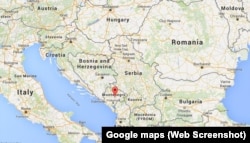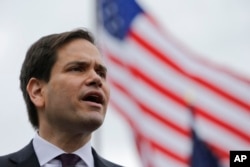The U.S. Senate has ratified Montenegro's admission into the NATO alliance, an event many lawmakers view through the lens of a deepening struggle between Western nations and Russia.
Senators approved the ratification by a vote of 97-2. Only Kentucky Republican Rand Paul and Utah Republican Mike Lee voted no. Paul argued that, as a NATO member, Montenegro would fall under America's security blanket while providing little in return.
Defenders of NATO expansion countered that Montenegro already has done much in support of the United States and the broader alliance.
"Montenegro actively supported the NATO-led operation in Afghanistan," said the chairman of the Senate Foreign Relations Committee, Republican Bob Corker of Tennessee. "Montenegro has taken these steps despite Russia's best efforts to undermine their progress [as a democracy] every step of the way."
Said Republican John McCain of Arizona, the chairman of the Senate Armed Services Committee: "This is more than the accession or non-accession of a small, 650,000-person nation. It is a test in this contest we are now engaged in with [Russian President] Vladimir Putin."
"Montenegro is trying to do everything that Putin hates. Alliances of democracy are his worst nightmare," said South Carolina Republican Lindsey Graham. "This is great day for freedom, Montenegro and NATO, and a bad day for Russia."
Ben Cardin of Maryland, the top Democrat on the Senate Foreign Relations Committee, said this of the vote: "[Montenegro joining NATO] will enhance our security, it will strengthen the alliance, and it will send a strong message of resolve to Russia."
The United States was one of three NATO members yet to formally approve the Balkan nation as the newest member of the alliance, originally formed in 1949 to provide common defense against the Soviet Union.
Secretary of State Rex Tillerson urged the Senate to act without delay. In a letter to the chamber's Republican and Democratic leaders, Tillerson wrote: "Montenegro's participation in the May NATO summit as a full member, not an observer, will send a strong signal of transatlantic unity and that no third parties have veto power over NATO decisions."
Added Republican Senator Marco Rubio of Florida: "The stakes here are extraordinarily high for the United States, for our European allies. We are watching as many Russians have turned out in cities in the thousands. They've turned out to protest the rampant corruption that fuels the Putin regime. And the Putin regime, as all totalitarian regimes do, has cracked down."
All 28 of NATO's members must ratify Montenegro's accession before it can formally join the alliance. Only three members have not finalized their approval. The vote in the U.S. Senate was blocked for months by two Republican senators, Rand Paul and Mike Lee, who oppose expanding the military alliance.
This report was produced in collaboration with VOA's Serbian Service.






